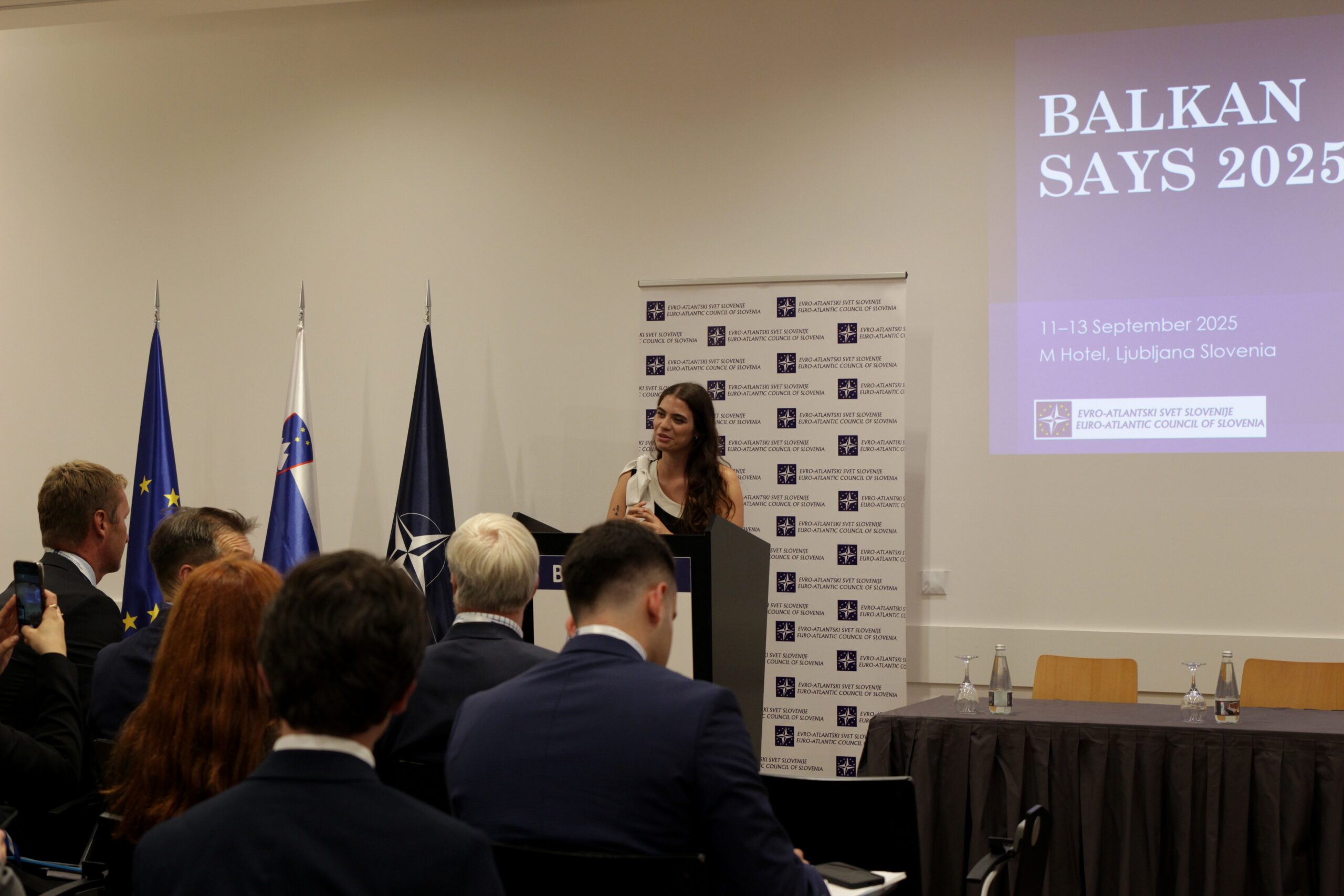
From 11 to 13 September 2025, the Euro-Atlantic Council of Slovenia successfully hosted the 13th edition of Balkan SAYS – Security Architecture Youth Seminar in Ljubljana.
This year’s edition brought together 50 young experts, diplomats, and researchers from 22 countries across the Euro-Atlantic area, fostering open dialogue on some of the most pressing security challenges of our time. Over three days, participants engaged in five thematic panels, interactive workshops, a keynote lecture, and networking activities — all designed to foster critical thinking, promote mutual understanding, and enhance cooperation among future security leaders.
The seminar opened with welcoming remarks by Dr. Iztok Prezelj, President of the Euro-Atlantic Council of Slovenia (ATA Slovenia), followed by Matic Kosirnik, President of the Youth Section of the Euro-Atlantic Council of Slovenia (YATA Slovenia). The formal opening address was delivered by the Minister of Defense of the Republic of Slovenia, Mr. Borut Sajovic, who underscored Slovenia’s strong commitment to youth engagement and international security cooperation.
Participants were further inspired by a keynote speech by Mr. Borut Pahor, the former President of the Republic of Slovenia, who reflected on the evolving security environment and emphasised the importance of strategic leadership and a geostrategic approach to stability in the Euro-Atlantic area and the Western Balkans.
At the heart of Balkan SAYS 2025 were five in-depth panel discussions that examined some of the most urgent and complex security challenges confronting the Euro-Atlantic area today.

The seminar opened with a panel on defending NATO values and Europe’s role in upholding freedom, human rights, democracy, and the rule of law, which set a strategic tone for the days ahead. Speakers underlined that while NATO was founded on shared principles, values alone cannot guarantee peace or stability unless they are underpinned by credible capabilities. The discussion focused on Europe’s responsibility to assume a greater share of the burden within NATO and to transform political commitments into concrete contributions. Participants explored how NATO’s 2025 capability targets will reshape European defense planning and force structures over the coming decade, and debated how the European Union can meaningfully support this effort through enhanced capability development, coordinated procurement, stronger NATO–EU alignment, and the long-term resilience of Europe’s defense industrial base. The panel made clear that ensuring Europe’s long-term security and credibility will require not only higher investments but also profound political, military, and industrial changes.
The second panel turned to frozen conflicts in the Western Balkans, examining how unresolved disputes continue to hinder regional stability and Euro-Atlantic integration. Speakers noted that legacies of the past—ranging from contested statehood and ethnic divisions to unsettled border issues—still shape political dynamics across the region, leaving space for external actors to exert influence. The debate emphasized that while these conflicts were not created by the current generation, they will not be resolved without its active involvement. Bottom-up initiatives, reconciliation efforts, and confidence-building measures were highlighted as essential tools to rebuild trust, strengthen regional cooperation, and re-energize the European and Euro-Atlantic integration process in the Western Balkans.
The third panel addressed equal opportunities and inclusion in security, stressing that representation is not a symbolic gesture but a core component of legitimacy, credibility, and operational effectiveness in defense and security institutions. Speakers underlined that inclusive structures enhance decision-making, reflect the societies they serve, and strengthen resilience in times of crisis. The discussion called for the full and equal integration of women across all levels of security policy and defense planning, arguing that diversity must be seen not as an optional ideal but as a strategic capability in itself.

Building on this, the fourth panel examined the challenge of disinformation and media resilience in the Western Balkans, a region often targeted by coordinated foreign and domestic influence campaigns. Participants discussed how disinformation erodes trust in institutions, fuels polarization, and undermines democratic processes. The debate focused on the need to strengthen independent media, protect freedom of expression, and promote critical media literacy, particularly among youth, as vital components of national and regional security. Strengthening societal resilience, it was concluded, is as important as developing military capabilities.
The final panel looked beyond the immediate neighborhood to explore cooperative security in NATO’s Southern flank, an area encompassing North Africa, the Middle East, and the Sahel. Speakers highlighted how instability in this region—driven by terrorism, protracted conflicts, migration pressures, and geopolitical competition—poses significant security risks to the Euro-Atlantic area. They stressed that NATO cannot afford to neglect the South while focusing primarily on its eastern flank, and called for a more coherent, coordinated, and responsible approach to addressing southern security challenges. This would require sustained political attention, closer cooperation with regional partners, and a clearer balance between deterrence, defense, and crisis prevention.
Together, these five panels illustrated how today’s security environment is deeply interconnected and rapidly evolving—and how addressing it requires new thinking, stronger cooperation, and the active engagement of the next generation of security professionals.

Balkan SAYS once again demonstrated the essential role of youth in international security policy. Through in-depth debates, collaborative workshops, and informal exchanges, participants brought fresh perspectives, critical questions, and innovative ideas to complex strategic challenges. The seminar was designed and implemented by the Youth Section of the Euro-Atlantic Council of Slovenia. The organizing team of 17 members conceptualized the panels, shaped their content, and moderated the discussions, making this year’s seminar a truly youth-led initiative.
The Euro-Atlantic Council of Slovenia extends its sincere thanks to the Ministry of Defense of the Republic of Slovenia for its invaluable and long-standing support, and to all speakers, moderators, and participants who contributed to the success of this year’s edition.
We look forward to continuing this tradition of fostering dialogue, cooperation, and leadership — and to welcoming a new generation of young security professionals to Balkan SAYS 2026.
Author: Matic Kosirnik





















